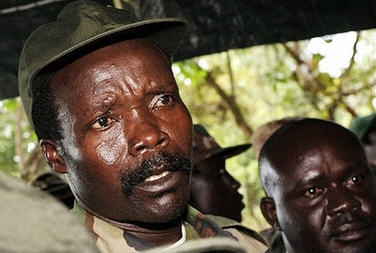
The head of UN peacekeepers in the Democratic Republic of Congo says a new strategy is needed to prevent massacres by the Lord's Resistance Army (LRA).
Alan Doss spoke to the BBC after evidence emerged of a five day-rampage by the rebel group last December in which more than 300 people died.
He said greater air mobility and better intelligence gathering was needed.
But Mr Doss said the LRA operated in small, highly mobile groups over a wide area, making the UN's job difficult.
The massacre was one of the worst ever committed by the group, Human Rights Watch said.
"We have to look at this as a problem dealing with small groups that move around a great deal," said Mr Doss.
"This requires better intelligence gathering, it requires particularly air mobility, and of course co-operation with the local people."
He added: "It didn't just happen in one place because... the LRA moves around a lot and these are small units, but of course they can inflict terrible damage.
"But even small groups, moving as they do in the bush, can create havoc. Their best weapon is fear and they create fear by their extremely brutal and violent tactics which we saw again in this latest massacre near Tapili."
LRA leaders initially claimed to be fighting to install a theocracy in Uganda based on the Biblical Ten Commandments.
But they now roam across Sudan and Central African Republic, as well as DR Congo.
In the latest attack, rebels hacked to death villagers and made others carry looted goods. Some 250 people were abducted.
The UN said it had heard rumours that an attack was to be launched around Christmas, and reinforced its troops in the area.
But they were deployed to towns like Dungu and Niangara rather than the remote villages where the killings took place.
On 13 December, a contingent of LRA rebels crossed the Uele river and arrived at a market in the village of Mabanga Ya Talo.
They pretended to be Congolese soldiers and asked for food and other goods.
Brutally killed
They then asked people to carry the goods back to where they had crossed the river, and when the villagers refused, the rebels turned on them.
Adults were attacked, captured, imprisoned in huts, then taken out and made to act as porters.
Anyone unable to keep up with the forced march was brutally killed.
The acts were repeated in villages all the way to Tapili, about 45km (30 miles) away.
Human Rights Watch, working with local organisations, has verified 321 deaths - but other activists have given far higher estimates.
Witnesses say the stench of death hung over the area for weeks.
Children were a particular target of the LRA.
At least 80 were taken by force - boys to become fighters, girls to be used as sex slaves by LRA fighters.
Related articles
- • 'Deadly environment' plus 'political and social' obstacles hinder Ebola fight, Security Council hears (July 24, 2019)
- • Ebola outbreak declared an international Public Health Emergency (July 17, 2019)
- • DR Congo Delays Results of December Election (January 6, 2019)
- • UN Report Blames Ugandan Islamists for 237 Killings in DR Congo (May 14, 2015)
- • ICC Case Against Bemba Wrapping Up as Another Opens (November 12, 2014)
- • Violence in North Kivu Kills 21, Mostly Women, Children (October 18, 2014)
- • Kerry Calls on Kabila to Honor Constitution (May 4, 2014)
- • Kerry in DR Congo for Security Talks (May 3, 2014)
- • Security Council extends UN mission, intervention force in DR Congo for one year (March 28, 2014)
- • Death toll in Lake Albert boat accident rises to 251 (March 27, 2014)
- • U.S. sending more personnel to Uganda to hunt LRA leader Joseph Kony (March 24, 2014)
- • Death toll in Lake Albert boat accident rises to 108 people (March 24, 2014)
- • DR Congo Takes Chairmanship of COMESA at Summit in Kinshasa (February 26, 2014)
- • New DR Congo amnesty law welcomed by UN envoys (February 5, 2014)
- • Colonel Mamadou Ndala Is Killed in Ambush (January 2, 2014)
- • DR Congo, M23 Rebels Sign Declarations Marking End of Kampala Peace Talks (December 12, 2013)
- • No 'Peace Deal' With Defeated M23 Rebels, DR Congo Says (November 11, 2013)
- • Congo Will Not Sign a 'Peace Deal' With Defeated M23 Rebels, Government Says (November 6, 2013)
- • Congo Army Takes Control of Mbuzi Hill From M23 Rebels (November 4, 2013)
- • Kabila Congratulates Congo Army for Defeating M23 Rebels (October 30, 2013)
- • Congo Army Liberates Rutshuru, Kiwanja and Kibumba From M23 Rebels (October 27, 2013)
- • Congo Army Dislodges M23 Rebels From Strategic Town of Kibumba (October 26, 2013)
- • Congo Army Takes Control of Kibumba After Fighting With M23 Rebels Resumes (October 25, 2013)
- • Rwandan Support for M23 Rebels Frustrates Attempts to End Fighting in Eastern Congo (September 26, 2013)
- • Rwanda 'recruiting for M23 rebels' (July 31, 2013)
- • UN Security Council debate focuses on peace efforts for Africa's Great Lakes region (July 25, 2013)
- • Warlord Bosco Ntaganda Turns Himself In at US Embassy in Rwanda (March 18, 2013)
- • Regional Leaders Sign DR Congo Peace Deal (February 24, 2013)
- • Obama Tells Kagame to Stop Support for M23 Rebels in Eastern Congo (December 19, 2012)
- • UN Security Council Condemns Latest M23 Attacks, Extends Sanctions on Rebels (November 28, 2012)
Tags: |








